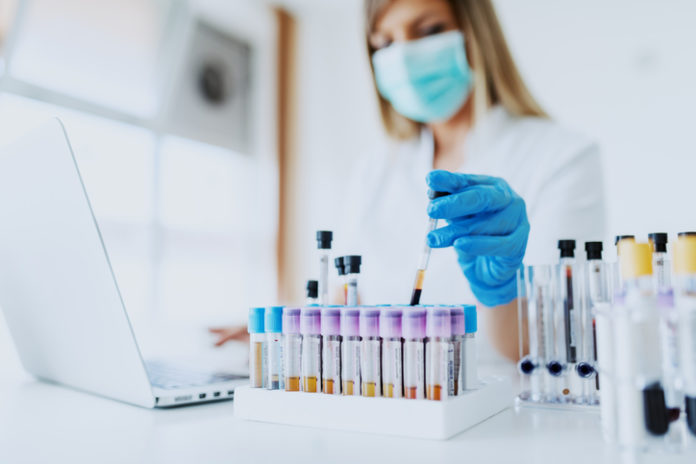Exact Sciences Corp. recently introduced the Oncotype MAP™ Pan-Cancer Tissue test for patients with advanced, metastatic, refractory, or recurrent cancer. The test gives physicians a better understanding of a patient’s tumor profile by providing information from genomic alterations in hundreds of cancer-related genes. This allows physicians to guide treatment decisions, such as targeted therapies or clinical trials.
DocWire News interviewed Rick Baehner, MD, chief medical officer of precision oncology at Exact Sciences, to discuss challenges associated with late stage cancers and how the Oncotype MAP can help.
What are the challenges in understanding late stage cancers?
Dr. Baehner: For advanced cancer patients, getting the information quickly to help their physicians make treatment decisions has the potential to be life changing. Not all tumors respond the same to treatment and for some cancer patients, first- and second-line therapies or standard of care options may not always be successful. In these cases, and in cases when the tumor is particularly aggressive, comprehensive genomic profiling using next-generation sequencing (NGS) can help provide valuable treatment guidance. While cancers are typically associated with detectable alterations in several different genes, only a subset of those genes are classified as “actionable” or associated with a drug therapy.
However, advanced, metastatic tumors are often only the size of a small bean and many times, only tiny tumor tissue samples are able to be obtained. Insufficient tissue samples can cause genomic tests to fail, and about 1 in 5 patients seeking genomic tumor profiling are rejected due to small specimen size or too few tumor cells. By reliably providing results regarding patient tumor biology from a smaller sized tissue sample than other available tests, the recently launched Oncotype MAP Pan-Cancer Tissue test minimizes the burden on the patient, overcoming one of the major obstacles to clinical NGS testing.
What does the Oncotype MAP test do?
Dr. Baehner: The Oncotype MAP test is a pan-cancer tissue test that provides rapid tumor profiling for advanced, metastatic, refractory, or recurrent cancer to help physicians and their patients make treatment decisions based on the patient’s distinctive tumor biology. The test may be used across all solid tumor types. Oncotype MAP test results support clinical decision making with actionable biomarkers associated with more than 100 therapies, over 45 combination therapies, and more than 650 active clinical trials associations.
The Oncotype MAP report provides:
- A picture of the patient’s genomic landscape highlighting all actionable alterations identified
- Potential therapeutic options for the patient based on key biomarkers detected, including associated levels of evidence and guideline recommended targeted therapies
- Potential targeted clinical trials based on individual test results
- A succinct yet integrated consultative discussion of the patient’s genomic analysis generated by an oncologist team. The analysis includes data gathered from the patient’s medical and treatment history.
Knowing these components helps physicians provide actionable insights on all available associated therapies that may improve progression free survival (PFS) without the need for large tissue samples. The Oncotype MAP test has been evaluated in more than 10,000 samples to date, with multiple peer-reviewed publications supporting its use. In an independent study published in 2016 that evaluated a previous generation of the test, patients whose treatment was guided by the Oncotype MAP (formerly Paradigm PCDx) test had a significantly increased rate of PFS when compared to patients who did not utilize the test (43% vs. 5%).[i]
When should healthcare providers prescribe the test?
Dr. Baehner: The test may be appropriate to help inform treatment options for the majority of the over 500,000 Americans facing advanced cancer each year.[ii] The Oncotype MAP test is typically utilized for patients when first-line or second-line treatment or standard of care options are not working. This is often referred to as “refractory” disease. It is also utilized for patients with cancers that are rare or of an aggressive nature with limited treatment options, and provides valuable treatment guideline indications when standard of care options are being determined in lung cancer.
The Oncotype MAP test addresses one of physicians’ primary concerns: the need to get quick, accurate results using a small tissue sample, without an assay failure. The Oncotype MAP test requires a minimum of 3 mm2 of tumor tissue[iii] for analysis, which is about the size of a grain of rice, with an optimal sample size of 75mm2. A peer-reviewed study published in PLOS ONE in 2018 confirmed that high quality results could be obtained from both small tumor samples and those with a low percentage of tumor cells in a clinical setting.[iv] Within these parameters, the Oncotype MAP test is highly accurate with >99% sensitivity (SNVs and Indels) and specificity, and detection down to ≥7.5% of mutant allele frequency.[v]
How does knowing the biology of a cancerous tumor impact the treatment approach?
Dr. Baehner: The Oncotype MAP Pan-Cancer Tissue test analyzes all critical targets to provide in-depth insights into genomic alterations in hundreds of cancer-related genes, including tumor mutations, copy number variants, fusions, tumor mutation burden, and protein expression.
The test utilizes both NGS of more than 250 genes and immunohistochemistry (IHC). This is important because there is no NGS surrogate for some IHC proteins and National Comprehensive Cancer Network guidelines typically do not accept NGS as a surrogate for IHC protein expression for some therapies. In addition, many new and experimental therapies target specific proteins (such as PD-L1) that drive tumor growth. Providing both genomic results and a robust analysis of traditional protein markers enables the test results to better determine which may be appropriate for treatment with a high degree of accuracy.
Anything else you’d like to share?
Dr. Baehner: In addition to providing comprehensive, actionable insights even with small tissue samples, the Oncotype MAP test provides results typically in 3-5 business days[vi] to guide timely treatment decisions, usually before the patient’s next follow up visit. In contrast, other NGS-based tests can take up to two weeks to analyze. For patients with advanced cancer, timely insights to inform treatment decisions is crucial. In one study, more than 15% of patients did not proceed with molecular profiling due to the worsening of their condition.[vii]
References
[i] Radovich, M, et al. Clinical benefit of a precision medicine based approach for guiding treatment of refractory cancers. Oncotarget. (2016); 7(35): 56491-56500. https://doi.org/ 10.18632/oncotarget.10606.
[ii] L.E.K. Analysis of NIH SEER Program (2016). ASCO 2020 Poster #184919 from Roche
[iii] Data on file, in-house assay optimization protected by trade secret/patent regulations
[iv] Morris, S, et al. Performance of next-generation sequencing on small tumor specimens and/or low tumor content samples using a commercially available platform. PLOS One. 2018 Apr 27;13(4):e0196556. doi:10.1371/journal.pone.0196556.
[v] Data on file
[vi] Turnaround time is based on qualified sample receipt
[vii] Von Hoff et al. Pilot Study Using Molecular Profiling of Patients’ Tumors to Find Potential Targets and Select Treatments for Their Refractory Cancers. JCO. 2010.
Credit: Original article published here.










